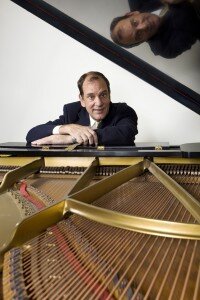A Precious Key to the Past — Marston Records
Ward Marston
jazz pianist and re-masterer extraordinaire
One of the joys of bopping around the music world is meeting extraordinary people who tend to wander into your life, quite by accident. Last week, I attended a surprise party for Vera Wilson, the dynamic founder and president of Astral Artists, to celebrate her 70th birthday. During the preliminary half-hour that guests milled and chatted, waiting for the guest of honor to appear, my ear was drawn to the music emanating from the far end of the room. A tall man in a powder blue blazer sat at a small old grand piano and played lush, full, and complex solo jazz. Without the benefit of a bass player or drummer, this pianist made his arrangements sound complete. It was a glorious way to start the party.
When Vera arrived, she was happily surprised, and a chamber music concert (trios performed to honor her, played by Alex Moutouzkine, piano, Benjamin Beilman, violin, and Clancy Newman, cello) was sublime. Afterward, I sought out the pianist in powder blue, who, I now noticed, lacked the faculty of eyesight.
“That was super playing,” I said. “How did you learn to play jazz like that?”
“I never took a jazz lesson in my life,” he said, smiling and turning toward me. “I listened to records of all the greats — Art Tatum, Fats Waller, Teddy Wilson. That’s how I learned.”
When I inquired if he played in clubs anywhere in the area, hoping I could hear him sometime, he said that his career for the past several years had taken a new direction.
“I’ve collected about 30,000 historical 78 rp.m vinyl records and I remaster them – mostly operatic singers and pianists.”
He added, matter-of-factly, “I won a Grammy for re-mastering the complete Rachmaninov recordings, for BMG.”
I was floored. “That recording is like my Bible.”
It turned out this was Ward Marston of Marston Records, whose mission it is to digitally re-master rare recordings of great musicians, long dead, in order to preserve their interpretation, the details of their technique, their sound, their timing, their voice. Being able to listen and study recordings like these is like having a link to an era of pianists who may have known or worked with the legendary composers themselves. It is like having a key to the door of a past, precious world.
At home, I perused the Marston Record catalog online and have decided that my first purchase will be a 2-CD set of a pianist called Raoul von Koczalski. I had never heard of Koczalski, but he was a student of Karl Mikuli, who was himself a student of Chopin’s. Mikuli’s edition of the complete piano works of Chopin is still published by G. Schirmer, and was the edition that my own teacher, Earl Wild, preferred.
Will hearing Koczalski give me insight into the way Chopin himself may have played or taught? I’m sure it will. I’m sure it will inspire me. I can’t wait to be happily surprised.


